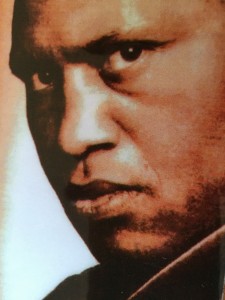April is National Poetry Month. And Richard Durham was a poet who loved the freedom of expression this art form provided.
“I think it’s the highest form of writing,” he once told a reporter.
So in honor of this month and to see an example of Durham’s poetic voice, the following poem was published in Golden Slippers: An Anthology of Negro Poetry for Young Readers, edited by writer Arna Bontemps.
Dawn Patrol
Night creeps over the city;
Streets spangle with kilowatt pearls,
Lights splatter over seas of shadows
Damning the flood of darkness.
Drunken night,
A hobo bowed over a bar of time,
Brooding over a black bottle of stars
Blinking like beer bubbles,
Soon comes the police patrol of dawn,
Night slowly staggers away
And then the day.
—Richard Durham, 1941
Durham’s mother came from a hardscrabble family of sharecroppers. They struggled to earn a living on the Mississippi farmlands they planted and harvested, trying to get out of the ongoing debt the family incurred. Probably inspired by the stories Durham’s mother told him about the “cropping” life, he wrote the following poem:
Cotton Croppers
A citron sun, a ghost of gold,
Pours thick heat down on the field.
Heat burst the bolls and floods the air
Where ragged croppers, like patches in a cotton cloud,
Dot the billowy acres,
Bag the bolls, swell the sacks.
Plod the rows; pick the cotton.
Wading through the turbid waves unable to feel
The glory of day for the hell of heat!
And to a winding road snaking besides the field
They have but to lift their eyes to see,
Unworried over the sun, the cotton,
The plight of the pickers,
Comfortable cars rolling by the road,
Touring through the heat
Plowing through the air.
—Isadore Richard Durham, undated
Happy National Poetry Month!
